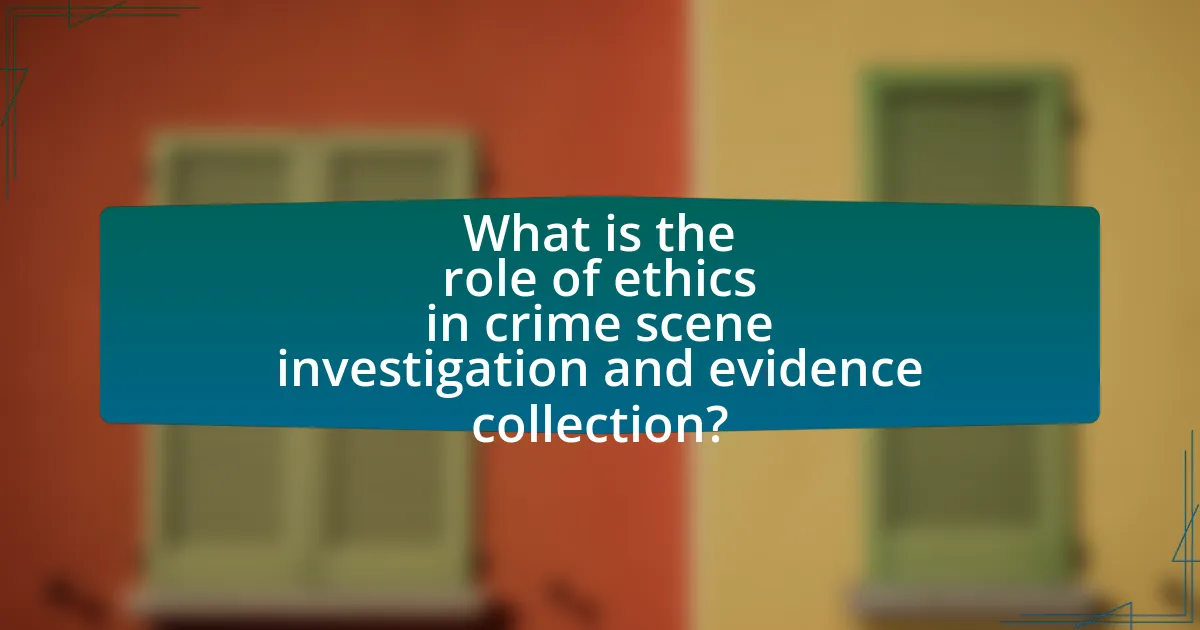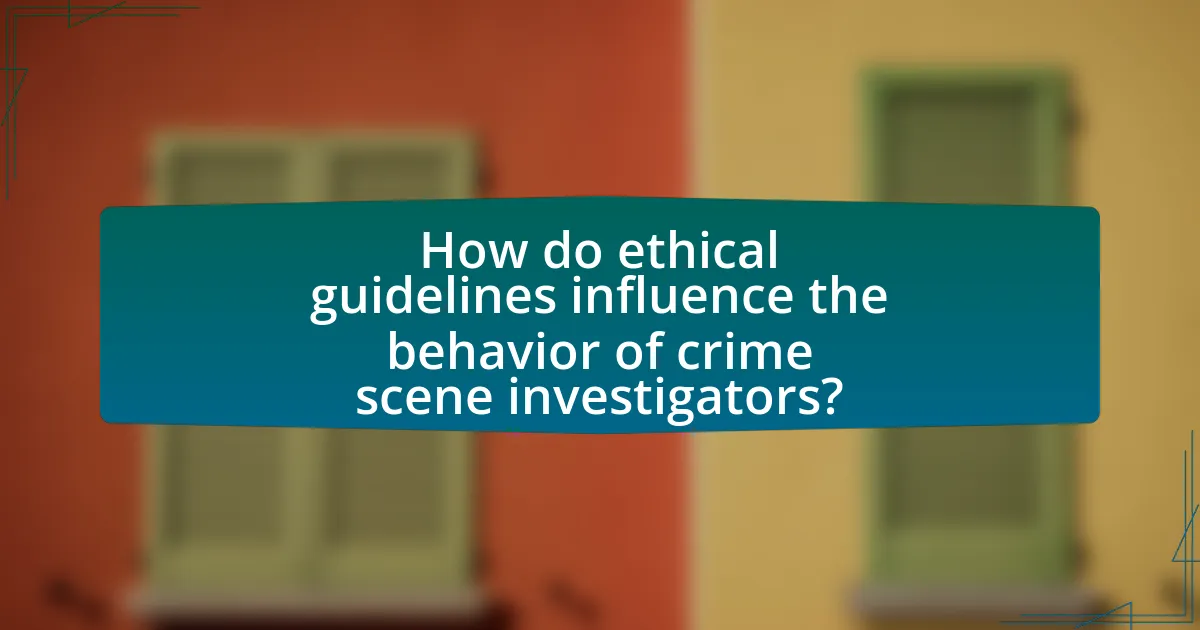The article focuses on the critical role of ethics in crime scene investigation and evidence collection. It emphasizes the importance of ethical guidelines in maintaining the integrity of evidence, ensuring objectivity, and respecting the rights of individuals involved. Key topics include the consequences of unethical practices, the principles guiding investigators, and the impact of ethical considerations on evidence collection. Additionally, the article discusses best practices for upholding ethical standards, the significance of oversight, and mechanisms for reporting unethical behavior, all of which are essential for fostering public trust and ensuring justice within the criminal justice system.

What is the role of ethics in crime scene investigation and evidence collection?
Ethics plays a crucial role in crime scene investigation and evidence collection by ensuring that procedures are conducted with integrity, respect for the law, and the rights of individuals involved. Ethical guidelines help investigators maintain objectivity, avoid bias, and ensure that evidence is collected and preserved in a manner that upholds the legal standards required for admissibility in court. For instance, the International Association of Chiefs of Police emphasizes the importance of ethical conduct in maintaining public trust and ensuring justice, highlighting that unethical practices can lead to wrongful convictions and undermine the legal process.
Why is ethics important in crime scene investigations?
Ethics is crucial in crime scene investigations because it ensures the integrity of the evidence collected and the overall investigation process. Ethical practices help maintain public trust in the criminal justice system, as they promote fairness, accountability, and respect for individuals’ rights. For instance, adhering to ethical guidelines prevents the mishandling of evidence, which can lead to wrongful convictions or the dismissal of cases. Studies have shown that ethical lapses in investigations can result in significant legal repercussions and undermine the credibility of law enforcement agencies. Therefore, a strong ethical framework is essential for upholding justice and ensuring that investigations are conducted in a manner that is both lawful and respectful of all parties involved.
What ethical principles guide crime scene investigators?
Ethical principles guiding crime scene investigators include integrity, objectivity, and respect for the law. Integrity ensures that investigators maintain honesty and transparency in their work, which is crucial for preserving the credibility of the evidence collected. Objectivity requires investigators to remain impartial and avoid biases that could influence their findings, thereby ensuring that the investigation is based solely on factual evidence. Respect for the law mandates adherence to legal standards and protocols, which protects the rights of individuals involved and upholds the justice system. These principles are essential for maintaining public trust and ensuring that investigations are conducted fairly and effectively.
How do ethical considerations impact evidence collection?
Ethical considerations significantly impact evidence collection by ensuring that the rights of individuals are respected and that the integrity of the evidence is maintained. Ethical guidelines dictate that evidence must be collected in a manner that does not violate privacy rights or lead to coercion, which can compromise the admissibility of evidence in court. For instance, the Fourth Amendment of the U.S. Constitution protects against unreasonable searches and seizures, requiring law enforcement to obtain warrants based on probable cause. This legal framework underscores the necessity of ethical practices in evidence collection, as failure to adhere to these standards can result in evidence being deemed inadmissible, thereby affecting the outcome of legal proceedings.
What are the consequences of unethical practices in crime scene investigations?
Unethical practices in crime scene investigations can lead to wrongful convictions, compromised evidence integrity, and public distrust in the justice system. When investigators fail to adhere to ethical standards, they may manipulate or overlook crucial evidence, resulting in inaccurate conclusions about a case. For instance, the case of the wrongful conviction of Anthony Ray Hinton, who spent nearly 30 years on death row, highlights how mishandling evidence and unethical practices can lead to devastating consequences for innocent individuals. Additionally, studies show that public confidence in law enforcement diminishes when unethical behavior is exposed, undermining the overall effectiveness of the criminal justice system.
How can unethical behavior affect the integrity of evidence?
Unethical behavior can severely compromise the integrity of evidence by introducing bias, contamination, or fabrication. When investigators engage in unethical practices, such as tampering with evidence or failing to follow proper protocols, the reliability of the evidence is undermined. For instance, if a crime scene investigator alters or fabricates evidence to support a particular narrative, it not only misleads the judicial process but also violates the fundamental principles of justice. Studies have shown that evidence integrity is crucial for accurate legal outcomes; for example, the National Academy of Sciences emphasizes that maintaining ethical standards in evidence collection is essential for upholding the rule of law. Thus, unethical behavior directly threatens the validity of evidence, leading to wrongful convictions or the acquittal of guilty parties.
What legal repercussions can arise from unethical practices?
Unethical practices in crime scene investigation and evidence collection can lead to severe legal repercussions, including criminal charges, civil liability, and loss of professional licenses. For instance, tampering with evidence can result in obstruction of justice charges, which carry penalties such as imprisonment and fines. Additionally, if evidence is collected improperly, it may be deemed inadmissible in court, jeopardizing prosecutions and leading to wrongful convictions or acquittals. Furthermore, law enforcement officers or investigators found engaging in unethical behavior may face disciplinary actions from regulatory bodies, including suspension or revocation of their licenses to practice. These legal consequences underscore the critical importance of adhering to ethical standards in forensic practices.

How do ethical guidelines influence the behavior of crime scene investigators?
Ethical guidelines significantly influence the behavior of crime scene investigators by establishing standards for integrity, objectivity, and professionalism. These guidelines ensure that investigators adhere to legal and moral obligations, which helps maintain the credibility of the evidence collected. For instance, adherence to ethical protocols prevents the mishandling of evidence, which could lead to wrongful convictions or the dismissal of cases. Furthermore, ethical guidelines promote transparency and accountability, fostering public trust in the investigative process. Research indicates that adherence to ethical standards in forensic science enhances the reliability of findings, as seen in studies conducted by the National Academy of Sciences, which emphasize the importance of ethics in maintaining the integrity of criminal investigations.
What specific ethical guidelines are established for crime scene investigations?
Specific ethical guidelines established for crime scene investigations include maintaining integrity, ensuring objectivity, and respecting the rights of individuals involved. Investigators must avoid contamination of evidence, document the scene accurately, and adhere to legal standards to uphold the chain of custody. These guidelines are crucial to ensure that evidence is admissible in court and that the investigation is conducted fairly. For instance, the International Association of Chiefs of Police emphasizes the importance of ethical conduct in their “Law Enforcement Code of Ethics,” which outlines the responsibilities of officers to uphold justice and protect the rights of all individuals.
How are these guidelines implemented in practice?
Guidelines for ethics in crime scene investigation and evidence collection are implemented through standardized protocols and training for law enforcement personnel. These protocols include procedures for securing crime scenes, collecting evidence, and maintaining chain of custody to ensure integrity and reliability. For instance, the International Association of Chiefs of Police (IACP) provides resources and training programs that emphasize ethical practices, which are essential for upholding the law and protecting the rights of individuals. Additionally, adherence to legal standards, such as the Fourth Amendment in the United States, mandates that investigators conduct searches and seizures lawfully, reinforcing ethical conduct in practice.
What training is provided to ensure adherence to ethical standards?
Training provided to ensure adherence to ethical standards in crime scene investigation includes comprehensive courses on ethical practices, legal guidelines, and professional conduct. These training programs often incorporate case studies, role-playing scenarios, and discussions on the implications of unethical behavior, emphasizing the importance of integrity in evidence collection and analysis. For instance, the International Association for Identification offers certification programs that cover ethical standards and best practices, reinforcing the necessity of maintaining objectivity and impartiality in investigations.
How do investigators balance ethical obligations with investigative pressures?
Investigators balance ethical obligations with investigative pressures by adhering to established ethical guidelines while managing the demands of their cases. Ethical frameworks, such as the American Psychological Association’s Ethical Principles, emphasize integrity, respect for individuals, and the importance of justice, which guide investigators in making decisions that uphold the law and protect the rights of individuals involved.
To navigate investigative pressures, such as time constraints and public expectations, investigators often prioritize transparency and accountability, ensuring that their methods remain within legal and ethical boundaries. For instance, the International Association of Chiefs of Police provides resources and training on ethical decision-making, helping investigators to remain focused on their ethical responsibilities even under pressure. This dual commitment to ethics and effective investigation fosters trust in the criminal justice system and promotes fair outcomes.
What challenges do investigators face in maintaining ethical standards?
Investigators face significant challenges in maintaining ethical standards, primarily due to the pressure to solve cases quickly and the potential for bias in evidence interpretation. The urgency to deliver results can lead to compromised decision-making, where investigators may overlook ethical protocols in favor of expediency. Additionally, cognitive biases, such as confirmation bias, can affect how evidence is collected and analyzed, leading to unethical practices. Research indicates that 70% of investigators report feeling pressured to prioritize case closure over ethical considerations, highlighting the systemic issues within law enforcement that contribute to these challenges.
How can investigators navigate conflicts between ethics and case urgency?
Investigators can navigate conflicts between ethics and case urgency by prioritizing ethical guidelines while employing time-sensitive strategies. Ethical frameworks, such as the American Psychological Association’s Ethical Principles, emphasize the importance of integrity and respect for individuals involved in investigations. By adhering to these principles, investigators can ensure that their actions remain justifiable, even under pressure. For instance, when faced with urgent situations, investigators can implement rapid assessment protocols that still respect the rights and dignity of all parties, thereby balancing the need for swift action with ethical considerations. This approach not only maintains the integrity of the investigation but also upholds public trust in the investigative process.

What best practices can enhance ethical conduct in crime scene investigations?
Best practices that can enhance ethical conduct in crime scene investigations include adhering to established protocols, maintaining objectivity, and ensuring transparency throughout the investigation process. Following established protocols, such as those outlined by the International Association for Identification, helps ensure that evidence is collected and preserved properly, minimizing the risk of contamination or misinterpretation. Maintaining objectivity is crucial; investigators should avoid biases that could influence their findings, as emphasized in the National Institute of Justice guidelines, which advocate for impartiality in evidence handling. Lastly, ensuring transparency by documenting all actions taken during the investigation fosters accountability and allows for external review, which is supported by research from the American Society of Crime Laboratory Directors, highlighting the importance of clear communication in maintaining ethical standards.
How can crime scene investigators ensure ethical evidence collection?
Crime scene investigators can ensure ethical evidence collection by adhering to established protocols and guidelines that prioritize integrity and respect for individuals’ rights. These protocols include obtaining proper consent for searches, maintaining the chain of custody for evidence, and documenting all actions taken at the scene meticulously. For instance, the International Association for Identification emphasizes the importance of following legal standards and ethical practices to uphold the validity of evidence, which is crucial for judicial processes. By implementing these measures, investigators can maintain the credibility of their findings and protect the rights of all parties involved.
What protocols should be followed to maintain evidence integrity?
To maintain evidence integrity, strict protocols must be followed, including proper collection, documentation, storage, and chain of custody procedures. Evidence should be collected using appropriate tools to prevent contamination, and each item must be clearly labeled with details such as the date, time, and collector’s name. Documentation should include photographs and written notes to provide a comprehensive account of the evidence’s condition and location. Storage must occur in secure, controlled environments to prevent tampering or degradation. The chain of custody must be meticulously maintained, with records detailing every individual who handled the evidence, ensuring accountability and traceability. These protocols are essential to uphold the integrity of evidence, as established by standards set forth by organizations such as the International Association for Identification and the National Institute of Standards and Technology.
How can transparency be promoted in the investigation process?
Transparency in the investigation process can be promoted by implementing clear communication protocols and regular updates to stakeholders. Establishing guidelines that require investigators to document their methods and findings in an accessible manner ensures accountability. For instance, the use of body cameras by law enforcement has been shown to increase transparency, as evidenced by a study from the University of Cambridge, which found that body-worn cameras reduced complaints against officers by 93%. Additionally, involving independent oversight bodies can enhance public trust and ensure that investigations are conducted fairly and openly.
What role does oversight play in maintaining ethical standards?
Oversight is crucial in maintaining ethical standards by ensuring accountability and adherence to established guidelines. It involves monitoring practices and procedures within crime scene investigations to prevent misconduct and uphold integrity. For instance, oversight bodies can review evidence collection methods and ensure compliance with legal and ethical protocols, thereby reducing the risk of contamination or mishandling of evidence. Studies have shown that jurisdictions with robust oversight mechanisms report fewer ethical violations, highlighting the effectiveness of oversight in promoting ethical behavior among investigators.
How can independent reviews contribute to ethical practices?
Independent reviews can significantly enhance ethical practices by providing objective assessments of procedures and decisions in crime scene investigations. These reviews help identify biases, procedural errors, and ethical lapses, ensuring accountability among investigators. For instance, studies have shown that independent oversight can lead to improved adherence to ethical guidelines, as seen in the implementation of independent review boards in various law enforcement agencies, which have been linked to a reduction in misconduct cases. By fostering transparency and trust, independent reviews contribute to a culture of ethical compliance, ultimately leading to more reliable and just outcomes in the criminal justice system.
What mechanisms are in place for reporting unethical behavior?
Mechanisms for reporting unethical behavior in crime scene investigation and evidence collection include formal reporting channels, anonymous hotlines, and internal review boards. These mechanisms allow individuals to report misconduct without fear of retaliation, ensuring accountability and integrity within the investigative process. For instance, many law enforcement agencies have established dedicated ethics officers or committees that oversee complaints and conduct investigations into reported unethical behavior. Additionally, whistleblower protection laws provide legal safeguards for those who report unethical actions, further encouraging transparency and ethical conduct in the field.
What practical tips can help investigators uphold ethical standards?
Investigators can uphold ethical standards by adhering to established protocols, maintaining transparency, and ensuring accountability. Following established protocols, such as those outlined by the International Association of Chiefs of Police, helps ensure that evidence is collected and handled properly, minimizing the risk of contamination or misinterpretation. Transparency in communication with colleagues and the public fosters trust and allows for scrutiny of investigative practices, which is essential for ethical integrity. Additionally, implementing accountability measures, such as regular audits and peer reviews, reinforces ethical behavior by holding investigators responsible for their actions. These practices collectively contribute to maintaining high ethical standards in crime scene investigation and evidence collection.


